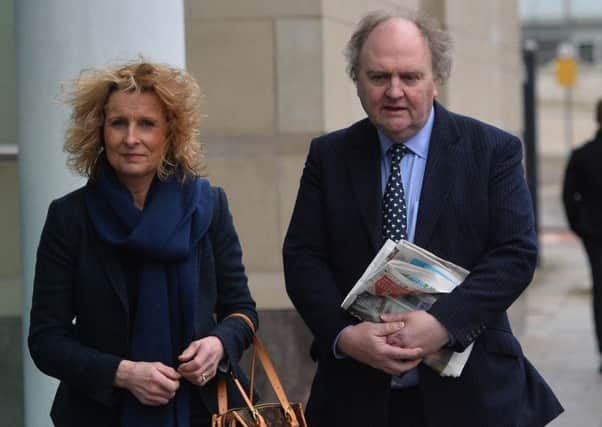Tragic rally driver Timothy Cathcart '˜wanted to emulate his father'


Timothy Cathcart, 20, from Co Fermanagh, was racing at an estimated speed of 110mph when he lost control of his modified DS3 Citroen which crashed into a number of trees and two fences during the Ulster Rally stage in August 2014.
The student was pronounced dead at the scene, just metres before the finish line near Fivemiletown, Co Fermanagh. He had sustained fatal head injuries.
Advertisement
Hide AdAdvertisement
Hide AdHis Welsh rally co-driver Dai Roberts, who was seriously injured in the crash, had a “miraculous escape”, Coroner Patrick McGurgan said during an inquest into Mr Cathcart’s death.
Mr McGurgan said that Mr Cathcart had wanted to be like his father Ian, who had also been a rally driver.
“What has been obvious to me has been the amount of passion people involved in rallying have for the sport. I am sure that same passion applied to Timothy Cathcart.
“There is no doubt that rallying has its own dangers. Danger seems to be part of the thrill. There are acceptable hazards. This is a sport he wanted to do for a considerable amount of time to follow in his father’s footsteps.”
Advertisement
Hide AdAdvertisement
Hide AdMr McGurgan added that Mr Cathcart’s mother and father invested a lot of time and money ensuring their son had the best car and co-driver. He said they have been left “devastated” by his death.
The inquest heard that at the time of the collision the road was dry, the surface was in good condition and there were no pre-crash defects to the car.
Mr Cathcart was racing at around 110mph when his car hit a crest in the road and he lost control of the vehicle, which then smashed into trees and fencing.
David Nicholson, a forensic scientist, told the court he believed that Mr Cathcart had done everything possible to try and regain control of the car.
Advertisement
Hide AdAdvertisement
Hide Ad“It would have been very difficult to regain vehicle control,” said Mr Nicholson who investigated the crash.
He estimated that it would have been just 1.9 seconds from the moment Mr Cathcart lost control of his car on the crest to the moment it hit the first fence.
The fence divided the narrow country road from a private house and garden.
Sections of the fence penetrated the front of the car on impact and hit Mr Cathcart on the side of the head, killing him.
Advertisement
Hide AdAdvertisement
Hide Ad“The fence post was very close to striking (Mr Roberts) as well,” said Mr Nicholson.
Mr McGurgan replied: “It was almost miraculous that the co-driver got out of the car.”
The coroner said there was a possibility that had the rails of the fencing been attached on the property side of the fence, and not the roadside, it might not have penetrated the car.
Technical director of the RAC Motorsports Association John Symes, who has since retired, told the inquest that rally drivers accept there are “acceptable hazards” on the roads.
Advertisement
Hide AdAdvertisement
Hide Ad“The ethos of rallying is very much take it as it is. There are hazards accepted by the rallying community. There are telegraph poles, fences, trees, all manner of things, but they are accepted as part of rallying,” he said.
Mr Symes said he believed that Mr Cathcart’s accident was caused by “lots of factors coming together at one time”.
“It’s the accumulation of lots of different issues. If you hit anything it’s a hazard. This fence was no more a hazard than anything else along this country road. It is seen as an acceptable hazard in the rallying fraternity.”
In his conclusions Mr McGurgan suggested that in future, ahead of a road race, a rally driver should accompany the race organisers along the route to see if high visibility fencing would be beneficial at any points.